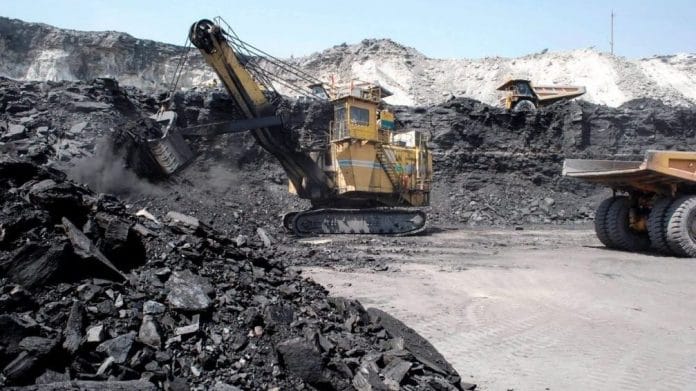Srinagar: Mining businesses from different parts of India are expanding into Jammu & Kashmir for the first time with last year’s scrapping of its special status opening the door for non-local players.
Companies from Punjab, Uttar Pradesh and Rajasthan have participated in public auctions and won leases to mine the union territory’s reserves of coal, marble and limestone, among other things.
The increased competition is yielding up to 60 per cent higher returns for J&K, say officials in the administration.
However, the local business community feels it has been placed at a disadvantage competing against bigger players who make bids they just can’t seem to match.
Also Read: Entrepreneurs to jobless in 3 months — no internet kills Kashmir’s next-gen businesse
Auctions begin
There are around 554 mineral blocks in J&K, of which 261 are in the 10 districts of Kashmir. Of these 261 blocks, each of which measures a maximum of 10 hectares, leases to 150-160 are being auditioned.
A significant number of the mineral blocks are situated along the banks of river Jhelum, considered a lifeline in J&K.
The blocks primarily contain sand deposits but also host an abundant supply of minerals such as limestone, gypsum, bauxite and borax, besides fossil fuel coal, and granite and marble.
The local administration has also identified gemstones such as sapphire, garnet and tourmaline.
The special status of J&K, a state until October 2019, barred non-J&K businesses from leasing or renting local mineral blocks. However, this changed as the Modi government scrapped Article 370 and Article 35A and opened the territory to outside players. Individuals and private companies from outside J&K were allowed to participate in mine auctions through an order issued last September. The auctions began in January.
In Kashmir, auctioning has been completed in six districts, officials said.
“These [the mines auctioned] include four in Budgam, 20 in Bandipora, 10 in Srinagar, three in Ganderbal and 36 in the volatile Pulwama region,” said Imtiaz Ahmed Khan, joint director in the J&K government’s Geology and Mining Department, Tuesday.
“Auctioning of mineral blocks in Shopian, Anantnag, Kulgam and Baramulla is to take place next week.”
More money for J&K
According to officials, the increased competition was bringing in more money for each block.
While the maximum base price the government can set remains uniform at Rs 5 lakh for a five-year lease, the bids are now running into crores, they said.
In Pulwama alone, officials claimed, the 15 blocks up for auction were leased out at Rs 17.82 crore. They fetched Rs 2 crore the last time they were leased.
All of the 10 mineral blocks identified in Srinagar were available for auction and yielded Rs 5.08 crore as opposed to Rs 1.85 crore the previous time.
“A mineral block in Pulwama was auctioned at Rs 3.25 crore. In Srinagar, one block fetched Rs 1.62 crore,” Khan said. “This is unprecedented.”
Officials approached by ThePrint refused to name the outside companies that have participated in auctions, but said it was “mainly two-three companies located in Uttar Pradesh, Punjab and Rajasthan”.
Also Read: ‘Dictatorship’, no ‘accountability’, no jobs: People in Jammu say Modi govt has failed the
‘Damage to environment’
While the union territory administration is enthused by the increased yield, local businessmen complain that they can’t compete against big businesses from outside J&K that “have a higher net worth and are thus able to bid more successfully”.
This is the first time auctions to J&K mines were held online, in line with a 2019 high court order aimed at making the process more fair.
However, sand miner Mohammad Yosuf, 60, said the e-auction was a death blow to his business.
“We would manually submit our tenders. Big businessmen would do it for bigger blocks and smaller businessmen like me would do it for smaller and cheaper blocks,” he said.
“Then suddenly we were told the entire process was online. With restrictions on the internet, we were at a disadvantage, but even if we overcame that, we couldn’t think of competing with the bidding prices offered by businessmen from outside Kashmir.”
Kashmir remains under partial internet restrictions six months after it saw a complete lockdown ahead of the scrapping of Article 370 and Article 35A. Partial 2G connectivity was only restored late last month, with broadband still unavailable.
According to Yosuf, during an auction for a Pulwama block, a local businessman made a bid of Rs 88 lakh. “A businessman from outside J&K bid Rs 1.56 crore,” he added.
Javaid Shah, another businessman, said the developments will impact both ecology and livelihood in Kashmir.
“Take, for instance, a block where we extract stones used for construction. Our labourers would handpick the stones, thus leaving the sand beneath it intact,” he added.
“When big money from outside Kashmir will arrive, they might simply use heavy extraction machines instead of laborers. The machines will dig up the entire earth instead of just stones. This means loss of livelihood and damage to the environment.”
Also Read: This is how Kashmiris are using Facebook, Twitter despite Modi govt ban on social medi







They will be destroyed by brave Mujahideen. All Hindus will be trapped inside the mines, and the blood of Hindus will be on hands and faces of Modi and Amit and Doval.